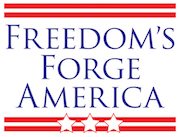From Armor’s Might to The Call of God Almighty, Chaplain (LTC) John E. Scott, United States Army
Despite being born at Wright-Patterson Air Force Base in Fairborn, Ohio, and, later, even though he had two older brothers in the Marine Corps, it would take another key life experience before the idea of a military career would become reality for the eventual Army Lieutenant-Colonel John Scott.
He was raised in Xenia, and then Yellow Springs, Ohio, where he would attend, and graduate from, Yellow Springs High School. While there, he became a three-sport athlete, participating in football (quarterback), basketball, and track, excelling in the later (110-meter-high-hurdles). So impressive was he, in fact, that in his junior year, he received a letter from West Point to see if he might like to run college track there with the Corps of Cadets. His mother then arranged for him to follow up by interviewing with the local West Point representative, leaving Scott then thinking about attending the Academy.
In the meantime, he would also receive a track scholarship offer from the University of Cincinnati. Before long, it was decision time. At which point an older, wiser former-Marine brother, reminded him that going to West Point would be like “enlisting in the Army,” while running track for the University of Cincinnati would enable him to be “a regular college kid,” with Army ROTC there, if that became his interest. Brotherly logic won out. Following high school graduation, Scott enrolled at the University of Cincinnati, where he would run track with distinction and, for the time being at least, put any ROTC thoughts “on the backburner.”
At some point in his freshman year, Scott decided to change his major from Electrical Engineering Technology to Criminal Justice. But when he dropped those Engineering classes for a new class schedule, he found himself with only 10 credit hours rather than the full-time 12 hours required to keep his track scholarship! And perhaps unexpectedly, here is where his career path begins to change. Seems that the only two-hour class then still available was ‘Introduction to Leadership’ within the ROTC program! And it would become a positive turning point. As Scott recalled, he: “enjoyed being around his classmates, and enjoyed learning about leadership.” So much so, in fact, that he would go on to apply for a two-year Army ROTC scholarship, and received it, as he began his junior year. Scott would continue to run track, while being in ROTC, as well, which “was just like being on another team.” As indicated, he really did enjoy his final two years of college, enhanced by his close association with his ROTC classmates, instructors, and the overall military-focused experience.
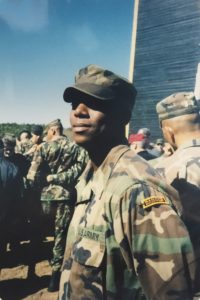
Second LT John Scott at his Ranger School graduation.
John Scott would go on to receive his Bachelor of Science degree from the University of Cincinnati in 1997, along with the designation as a Distinguished Military Graduate, with his commissioning on June 14th (Army birthday) as a Second Lieutenant in the Armor Branch. His first duty assignment would be at Fort Bragg, North Carolina. But first, it was off to the Armor Basic Course at Fort Knox, Kentucky (November 1997 – March 1998). Followed then, in April 1998, by Airborne School, finally getting to Fort Bragg that June.
Once there, all of the platoon leadership slots were full, so his commander asked him if he wanted to keep the schooling going by heading directly to Ranger School at Fort Benning in Georgia! He accepted and excelled (September – November 1998)!
Upon his return, at last, to Fort Bragg, he became second platoon’s leader in Alpha Troop 1-17th Calvary. Followed in one-year by his move to become the Executive Officer for Alpha Troop 1-17th, a position he would hold for one additional year. Then Executive Officer for Headquarters Troop, moving later to become Troop Commander for two Calvary Squadrons, all while serving in the 82nd Airborne Division at Fort Bragg.
More Army schooling followed. First came the Infantry Captain’s Career Course in January 2001(six months), then on to the Combined Armed Service and Staff School (August 2001). Before we get too far ahead, so as not to overlook his previous key accomplishments, following Ranger training, Scott attended the Advanced Airborne School Jumpmaster Course (1998), Air Assault School (1999), and SERE High Risk Level C training (2000).
After his two prior 2001 training sequences, in October of that year, Scott went to the Armor Center at Fort Knox, where he took command of a Cavalry Troop (Echo 5-15 CAV), a position he would hold for the next 19-months. After this training troop command, he was promised a second command, this one to be in a regular Army Deployable Force Command unit. Asked where he wanted to go, without hesitation, Scott selected Third ID at Fort Stewart (Hinesville, GA). Unfortunately, at the time, the appropriate commands there were filled, meaning a three-year wait for a command opportunity. Asked for a second preference of those available, Scott chose Korea!
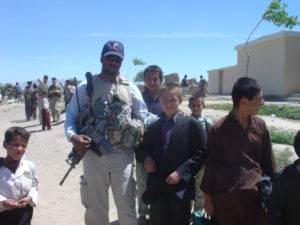
Captain John Scott with children in an Afghanistan village.
“So, I ended up going to Korea and got a second command there for Headquarters and Headquarters Company (47th CAV), where he would command troops for about 14-months (July 2003-October 2004). Recalled Scott: “I really enjoyed my time and command over there.” Considered to be “an unaccompanied hardship tour, I got to pick my next location assignment.” So, at that point, he opted to return to Fort Bragg. And here his first service transition would take place, this being from commanding combat arms troops to the Army’s “functional area” of Civil Affairs. He would devote the next year to Civil Affairs Officer Training, specifically the Psychological Operations sequence. Followed by the Regional Studies Course, then the Civil Affairs Qualification Course, and finally four-months of French Language School (predictor of world regions he’d likely be assigned), completing that package of studies in January 2006. “I then went immediately to Afghanistan, my very first Army deployment!” remembered Scott. There, although his control branch was still Armor, he was serving then as a Civil Affairs Team Leader (January-June 2006). An assignment he considered to be “really neat.” “We did a lot of humanitarian assistance, after talking and coordinating with local leaders, so that was all good.”
All good, that is, with the exception of one very close call. And Scott remembers it very clearly: “There was a mission where the organization I was working for had arrested some people the night before. So, after these arrests, they want to send a civil affairs team back to that same location to assess any damage and reassure the people there that if there’s anything the military can do for them, we’d try our best to make it happen. So, we were supposed to go back to this village the next day. And what we were going to do was pass out some humanitarian supplies, do some medical work, and then just talk with the leaders, along with assessing any damage. But in our dining tent that night, our interpreter said, ‘hey, you need to know that everybody already knows about the follow-up mission that you’re scheduled to go on tomorrow. Even some of the contract local nationals who work here in the dining facility. They know.’ So, our interpreter felt certain that our mission was compromised. At that point, I had a decision to make. People weren’t supposed to know that we were planning to go in there. I had to let my higher-ups know that our plan was likely compromised. We did a little more assessment of the situation. Finally, I said, hey, I don’t think we should go on this mission. Decision made, we didn’t go. The next day, some Afghan police did, in fact, go there and they were ambushed on the way into that town. That would’ve been me and my team! We did end up going back there about a week later. We found out, then, that the insurgents had actually put a bounty out on civil affairs teams and people doing humanitarian work, because they did not want us winning those hearts and minds! Turns out that was the only time we had potentially been in acute danger during our deployment missions.”
Meanwhile, it was while he was in Afghanistan that John Scott’s second, and most long-term, impactful, Army transition decision began. Which was his serious consideration of now transferring from Combat Arms and Civil Affairs to becoming an Army Chaplain. Here while on deployment, he realized that he was then facing a career crossroads. He had reached the point where he was up for promotion to Major. By Army regulations, had he taken that promotion, the door to his chaplaincy dream would have slammed shut. So, with that key promotion, he could have either gone back to armor or stayed with civil affairs, but chaplaincy would no longer have been an option. While there, in Afghanistan, looking toward his hoped-for future, Scott had actually begun taking his first seminary course online! Along with that move, he also sent an email to get in touch with an Army chaplain recruiter.
It was actually way back during collegiate ROTC Summer Advance Camp at Fort Bragg, when he had first begun attending chapel services on Sundays. Scott then shared some of his long-considered thinking about his growing desire to make this key transition. The Army career move he considered now to be the right one for him. Sharing his deeply held reasoning for moving over from combat arms and civil affairs, to full-time chaplaincy, John Scott revealed his deepest heartfelt thoughts: “Back in 1996, I was engaged to be married. My future wife and I shared an infant daughter. I knew then that I just wanted to be a better father. And I felt like having a strong faith in God was the right way to go with that. So, in 1996, I became a Christian. My wife was already a Christian and, you know, I just felt like that kind of faith, that kind of foundation, was good for building a family. And I well-remembered that, back during 1998’s Ranger School, I was going to the chapel services that the chaplain there offered in the field, and they just really encouraged me. After one of his services, I actually wrote a letter to my wife and said, hey, I think I want to be a chaplain someday. You know, his services really help, and I think I want to do that for soldiers down the road. So that was in 1998 when I wrote that particular letter indicating my building future desire. And then it was in 2006, in Afghanistan, when I finally got in touch with the chaplain recruiter, began talking with him seriously about it, and then I put in a transfer packet.”
The decision made, and approved by the Army Chaplain Corps, John Scott then entered seminary as a hybrid (in-person and online) classes degree program student at Liberty Baptist Theological Seminary, a component of Liberty University, at which point he became designated as a ‘chaplain candidate.’ For his next three years of seminary study, he would be temporarily removed from active-duty status and assigned to the Virginia National Guard (with drill weekends & summer training). Fortunately, however, his overall Army service time would continue uninterrupted. It should be noted that, to their credit and commitment, Scott and his wife paid for his three years of seminary schooling themselves. Reason: The Army doesn’t pay for seminary, and had he taken available tuition assistance from the Guard, he would have then been obligated to serve a Guard commitment, rather than, as planned, coming immediately back onto Army active duty following his graduation. That simplified the tuition decision!
After his three years of seminary study and graduation, he would finish his leave-for-study ‘packet,’ and apply back to the Army Board to be considered as an official Army chaplain. So, then, in November 2009, John Scott was returned to active duty as a United States Army Chaplain and was officially re-commissioned as such in June 2010.
You’ll recall that Scott’s trade-off for pursuing an Army Chaplaincy was giving up, for a time, his pending promotion to Major. Well, that ‘for a time,’ indeed proved to be quite a lengthy amount of time. As he remembered it: “I stayed a Captain for a very long time. Typically, you wear the rank of Captain for six or seven years. I wore mine from almost going to Major the first time (3 ½ years in the National Guard while in seminary), and then while serving as a Chaplain for about an additional 15-years or so. That’s about a little more than twice the normal promotion time!” But he accepted the considerable number of years of delayed promotion because of the positive decision he had made to train for, and then move into, the Chaplaincy.
From September 2010 to May 2011, in his assigned new role as Battalion Chaplain for 2nd Battalion, 325th Airborne Infantry Regiment, 2nd Brigade Combat Team, 82nd Airborne Division, he would do pre-deployment training, followed, then, by an actual deployment to Iraq, in June 2011, as a part of ‘Operation New Dawn.’ “Our charge,” remembered Scott, “was to continue to train, and assist, the local army, along with the local police, so that both were capable of carrying out their own operations. This ‘Operation’ was intended to be the shutting down of our efforts in Iraq. At one point, there was a chance we were going to be extended past December, but our leaders didn’t work out the necessary departure deal, so regardless, in December 2011, they shut it all down and we departed for home. Overall, that deployment wasn’t that bad. Although, we did have one of our squads, driving in a vehicle, get hit by an IED. In that event, one of our infantry men was killed instantly and another one was pretty badly injured. That happened right outside Baghdad.” Thus ended Scott’s first deployment as a chaplain. He would end up spending a total of just under three years (2013) with that unit.
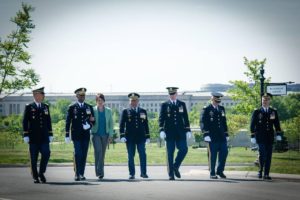
Major John Scott (second from left) conducted his final funeral service as an Arlington National Cemetery Chaplin, joined by his wife Gwen Scott, escorted after the service by colleagues.
In June of that year, he was assigned to be a cemetery chaplain for the Army at Arlington National Cemetery. “While there, I would be conducting anywhere from three to five funeral services, four to five days a week.” He would serve at Arlington from 2013 to 2015.
Then and there, at long last, in March 2015, John Scott received his promotion to Major! Followed in April of that year by a move from the National Cemetery “up the hill to Fort Meyer to become the regimental chaplain for the Old Guard” the special soldier unit (i.e., the Third United States Infantry Regiment), that serves as the ceremonial Honor Guard at Arlington. From 2015 to 2017, Major Scott was the Regimental Chaplain conducting perhaps as many as 600 total funerals between those two assignments (Arlington & Fort Meyer), from 2013 to 2017. “It was quite an honor to be up there,” recalled Scott. Following those very special assignments, he was then selected to attend the Command and General Staff College at Fort Leavenworth, Kansas, for military studies that would last one-year (2017-2018).
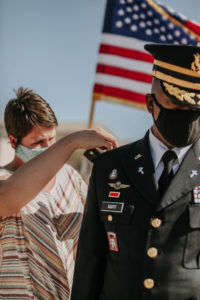
LTC Scott’s promotion ceremony (2021), assisted by his wife Gwen Scott.
After his graduation in June 2018, he went to Fort Bliss, Texas for a two-year assignment as the Deputy Division Chaplain for the Army’s First Armored Division. Then, in 2020, he moved over to the Garrison at Fort Bliss to become the Garrison Chaplain there for about six-months. The Army would then move him across the country to the Pentagon in the D.C. area, where he would serve as the Communication Strategy Officer for the Army’s Chief of Chaplains.
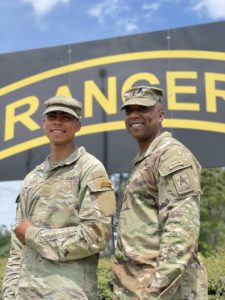
LTC Scott’s son Second LT Maliek Scott’s graduation from Ranger School (2021)
Remembered Scott about that assignment: “It was kind of a neat position. I got to write some speeches for the Chief of Chaplains, along with helping him prepare for those speeches. I was also able to do some social media management, as well as taking some photos and doing videos, then writing stories, just like a regular PAO (Public Affairs Officer) would do!”
Towards the end of his time there, around June 2022, the Army found out that one chaplain wasn’t going to be able to take the position for which he had been selected. So, then, a few more chaplains were moved around, with the end result being that they didn’t have a division chaplain to come to the Third Infantry Division. Remembered Scott: “I had already gone through the assessment program and assessed favorably to, in fact, become a division chaplain. But that was supposed to happen in 2023. It was just 2022 now! But the chaplain’s branch called me and said, hey, you’re going to go a year early, and you’re going to go to Fort Stewart!” Thus began his two-year stint (2022 to 2024) as Fort Stewart & Hunter Army Airfield’s Division Chaplain, with overall supervision of 35 combined post chaplains, of whom five were direct reports (brigade-level chaplains). As this is written, all too soon it seemed, his assignment here with us would conclude at the end of March 2024. This fine Chaplain would then move to an assignment in the Washington, DC area.
With regard to his time serving here in Coastal Georgia, Chaplain Scott was asked his opinion of the level of military support he had witnessed over these past two years among the citizens of both Hinesville, GA (Fort Stewart) and Savannah, GA (Hunter Army Airfield). Said he: “I think it’s really good. There is some great integration here between the civilian leaders and the leadership in place at Fort Stewart and Hunter. For instance, larger employers in the area are always anxious to interview our people who are retiring, or ending their service commitment, for both employment and internships, as a lot of our folks obviously would like to retire in this area, because, frankly, it is so receptive to both active and former service members. The sense of community we’ve enjoyed, both on the installation(s) and outside, has been some of the best I’ve experienced over my two-plus decades of Army service.”
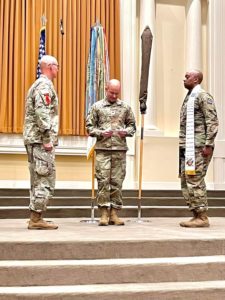
Fort Stewart departure ceremony on March 15, 2024 (LTC Scott on right)
The conversation then turned to leadership. Chaplain Scott was asked whether he thought strong military leaders were born or made? His response: “I think that, at least to some extent, they’re ‘made’ because there’s no substituting for experience. You know, you can be born with a high IQ, and/or athletic ability, and all of those other factors, but it’s experience that puts it all into context. So, I do think it’s a mix, but I think that the investments that people have made in me have really made the difference. I’ve been blessed with some fine role models, the really good soldier-leaders that I’ve had. So, I definitely think that, without their lasting input, I wouldn’t be the same person, or leader, that I feel I’ve become.”
Continuing on the leadership theme, the Chaplain was asked if he could think of a male or female senior officer who he remembered as being an outstanding leader, and what qualities made him so? He responded without hesitation: “Yes, there are a bunch, but I will go with my Brigade Commander Colonel at the Old Guard, who’s now the Commanding General for the U.S. Army Recruiting Command, Major General Johnny Davis. And, for me, the thing that made him outstanding was that he’s just so personable. Whenever he engaged with people, he would do so fully. He never seemed like he was in a hurry. Regardless of the rank of the soldier he was talking with, Colonel Davis made him or her know that he was talking directly to that soldier, even caring to learn about where he or she was from. When he asked: ‘How are you doing?’ he made eye contact and stopped and listened closely to their response. So, what that did was to make everyone in that brigade, and that regiment, completely motivated to do a good job, and to be loyal to him. And for me, that was just the right model for how to lead a unit. He let his staff handle all of the staff and detail work to be done, so that he could just lead. Being certain that he had the time to actually be the great leader that he was then, and still is.”
Then, finally, Chaplain Scott was asked what best advice he would give to a young enlisted soldier, or officer, just beginning what he or she hoped would become a military career. Said he: “The advice would be the same as that I give to a lot of the chaplains just coming in by a direct commission, that is, those without basic training, those with no prior service, and perhaps my biggest advice would be to just ask questions. There is so much knowledge and experience held by those serving all around you. For instance, in my case specifically, to those I supervise, my advice is to take a close look at the issue or problem in question, and if you can’t figure it out in 5 or 10 minutes, just ask me! Shoot me a message, give me a call, or just come by the office. Let’s work it out together. But don’t struggle with the issue or problem for a long time. It’s perfectly fine to simply ask questions.”
Wondering if there was anything else that Third Division Chaplain Scott might like to share, he thought for a second and thoughtfully added the following to our discussion: “I guess the one thing further is that I really have enjoyed the chaplaincy. It is a unique position. People naturally think of the religious aspect of it, which is absolutely very important, but the day-to-day thing that I feel we bring to the Army is the human connection. Commanders and other leaders always have a lot of different things on their minds, meaning that they can’t always be as involved in the human dimension as they’d like. And that’s where the Chaplains and our Religious Affairs Specialists (the enlisted side of the chaplaincy branch) come in. To be there for people in times of struggle or perhaps even in some dark times. We’re there to listen and give advice. So, we in the chaplaincy have to know about the entire Army enterprise in order to be able to assist people to get linked up with the help they may need. And that has been the most rewarding for me, assisting soldiers, their families, and our Army civilians, with issues and problems occurring in the human dimension.”
Concluding our discussion time together, here is some additional information for the reader to know about this very impressive Senior Army Chaplain. He has earned the following graduate certification and degrees: Certificate in Communications and Business Administration, Liberty University (2021); Doctor of Ministry, Wesley Theological Seminary (2020); Master of Military Arts and Sciences, U.S. Army Command and General Staff College (2018); Master of Divinity, Liberty Baptist Theological Seminary (2014); Master of Religious Education (2009) and Master of Arts Religion, (2008) Liberty Baptist Theological Seminary.
LTC Scott’s military awards and decorations include: the Meritorious Service Medal (6 Oak Leaf Clusters), the Army Commendation Medal (3 Oak Leaf Clusters), the Army Achievement Medal (2 Oak Leaf Clusters), the Afghanistan Campaign Medal, the Iraq Campaign Medal, the Global War on Terrorism Service Medal, the Senior Parachutist Badge, the Air Assault Badge, and the Ranger Tab.
Chaplain John Scott married his wife, Gwen, in 1996, and they have been blessed with four children, daughters Jonni, Kara, and Sharon, and son Maliek. He is presently approaching 27 years in Army service to America.
Copyright March 2024 William L. Cathcart
